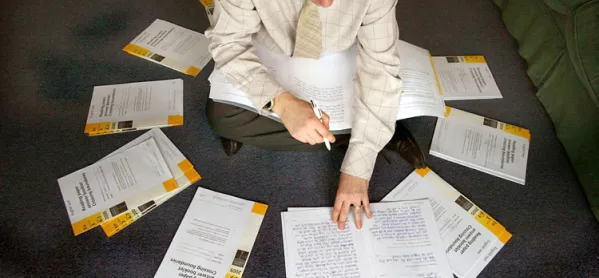I used to take a bag full of marking wherever I went.
If we were going somewhere in the car, I would sit in the passenger seat and mark books; if I was watching my son in a gymnastics class, I would mark a few books; any spare moment pretty much, I would be marking books.
This was partly because of my stage in life: I was the mother of very small children, and so work tended to be carried out during snatched periods between family times.
But there was another reason for my ever-present marking bag: I did an awful lot of written marking.
Quick read: How playing catch could boost pupils’ maths attainment
Quick listen: What you need to know about early maths teaching
Want to know more? How picture books help maths teaching
Looking back, I never really questioned whether it was the right thing to do. My intuition was that it must be a good thing for my students. I knew that feedback had been highlighted as an effective (relatively cheap) way of supporting their learning and I, alongside many others, interpreted that as “written marking (especially ‘triple marking’) supports learning”.
Marking mania
I remember a comment from one child that I wrote “so much” on his work, “much more than any other teacher”, and I took this as a badge of honour!
Obviously, if I was writing lots in students’ books, I must be doing a really good job, because the tomes I was writing on their work meant that I was giving them lots of feedback.
But what was that feedback? Did they understand it as I had intended? Did they do anything more than pay lip service to it when they responded to it? And did it have the effect that I’d hoped it would when I’d written it?
And, perhaps more importantly, were the benefits to my students of all this marking worth the impact it had on my life and my health? Or could the time I had spent doing it have been more effectively used for more useful activities like planning next steps?
A better way?
I began to do some research, reading papers like the EEF’s A marked improvement?
The authors of this report set out to discover what best practice was in written marking in schools. What they actually found was teachers exerting a large amount of effort in marking books, and a very small number of robust studies suggesting that was a good idea.
In fact, they concluded that high-quality evidence on specific approaches to written marking in a school setting was so limited that there was little point in conducting a meta-analysis or a systematic review on the research behind it.
The report does identify a number of key questions that schools should consider when developing their marking strategies, including considerations around workload. And certain findings do emerge from the evidence that could aid them in making these decisions.
Marking tips
These include:
- Careless mistakes should be marked differently to errors resulting from misunderstanding.
- Awarding grades for every piece of work may reduce the impact of marking,
- The use of targets to make marking as specific and actionable as possible is likely to increase pupil progress
- Pupils are unlikely to benefit from marking unless some time is set aside to enable pupils to consider and respond to marking.
- Some forms of marking, including acknowledgement marking, are unlikely to enhance pupil progress.
The authors suggest that schools should mark fewer pieces of work but mark them better, and they highlight a previous recommendation that all marking should be driven by professional judgement and be “meaningful, manageable and motivating”.
This is a great example of why it’s important to interrogate what we do. We shouldn’t do things simply because “we’ve always done it that way”, especially when the potential impact on our lives is significant.
I no longer carry a marking bag around with me. And for that, I shall always be grateful.
Dr Niki Kaiser is network research lead at the Norwich Research School at Notre Dame High School





